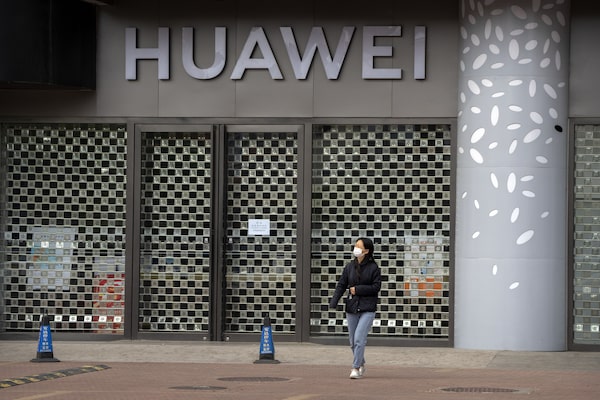
Canadian telecom companies that currently use Huawei and ZTE gear in their networks will have to remove it over a period of several years.Mark Schiefelbein/The Associated Press
Canada will ban Huawei and ZTE from Canada’s 5G networks, federal ministers announced Thursday, stating that a national intelligence review concluded that the two Chinese companies pose potential security risks.
Until this week, Canada was the only member of the Five Eyes intelligence-sharing alliance – which also includes Australia, Britain, New Zealand and the United States – that had not yet banned or restricted the use of Huawei 5G mobile equipment.
Canadian telecom companies that currently use Huawei and ZTE gear in their networks will have to remove it over a period of several years. ZTE, like Huawei, is a technology company that specializes in telecommunications equipment.
The fifth generation of wireless technology promises faster speeds, lower lag time and a vast increase in the number of devices that can be connected, enabling new technologies ranging from remote surgeries to autonomous vehicles.
The decision on Huawei has been years in the making and was being considered while Canadians Michael Spavor and Michael Kovrig spent nearly three years in Chinese prisons after being detained in reported retaliation for the arrest of Huawei chief financial officer Meng Wanzhou. She was arrested in Vancouver in 2019 at the request of the U.S., which sought her extradition on bank-fraud charges.
Mr. Kovrig and Mr. Spavor were freed and came home in September after Washington and Beijing reached an agreement that allowed Ms. Meng to return to China as part of a deferred prosecution agreement.
Huawei CFO Meng Wanzhou makes first public address since resuming duties after Canadian detention
Trudeau’s new national security adviser Jody Thomas is hawkish on China
Since the release of the two Canadians, the Liberal cabinet has been hinting that a decision was imminent.
Innovation Minister François-Philippe Champagne and Public Safety Minister Marco Mendicino made the telecom announcement on Thursday at a late-afternoon news conference on Parliament Hill.
Mr. Champagne said the decision to ban Huawei and ZTE “follows a full review by our security agencies and in consultation with our closest allies.”
Mr. Mendicino said the security review of the two companies was thorough and meticulous.
“It reflects the reality that in these two particular instances, that there is a need to ensure that we prohibit the installation of their equipment and technology within the 5G network, given the potential risks they pose to national security,” he said, without providing details on the nature of the risks.
The ministers said the government will soon introduce related legislation that would create a framework for protecting Canada’s telecommunications system. The ministers said this framework would also include the finance, energy and transportation sectors.
Their comments suggest the legislation will be tabled before Parliament rises in June for the summer recess.
Prime Minister Justin Trudeau had said in September that the cabinet would soon rule on whether to ban Huawei. At that time, he linked the coming decision to the release of Mr. Spavor and Mr. Kovrig. Mr. Trudeau had noted that many Canadian telecommunications companies had already started to remove Huawei from their networks.
Chinese government officials have previously warned Canada not to ban the company and suggested that there would be consequences to such a decision. The Chinese embassy did not immediately respond to a request for comment Thursday.
Alykhan Velshi, vice-president of corporate affairs for the Americas at Huawei, called the decision disappointing for the company’s 1,500 Canadians workers. “The government was given multiple opportunities to actually give a specific example about the national-security threat that Huawei poses,” Mr. Velshi said in an interview.
“They failed to do so because there isn’t one. For 14 years, we’ve been part of Canada’s telecommunications network and we’ve never received a complaint from the Canadian government about our equipment,” he said.
Mr. Velshi added that the company is focused on supporting existing Huawei equipment in Canada and will be looking closely at the legislation when it is introduced.
“You can’t discriminate against people and businesses because you have a disagreement with their government,” Mr. Velshi said.
Canada’s major telecoms have already signed deals with other 5G suppliers – including Sweden’s Ericsson Inc., Finland-based Nokia Corp. and South Korean conglomerate Samsung Electronics Co. Ltd. – while the review dragged on for three years.
Rogers Communications Inc. has relied primarily on Ericsson for its wireless network equipment. BCE Inc.’s Bell Canada and Telus Corp. have used gear from Huawei extensively in their 4G LTE networks. Both Bell and Telus had vowed not to use Huawei equipment in their “stand-alone” 5G networks unless Ottawa allowed it, but have been delivering their initial 5G service by adding a channel on top of those existing LTE networks.
Bell has been gradually replacing Huawei products with those from Nokia as part of its regular network upgrades. The process of swapping out Huawei gear with Ericsson and Nokia equipment will cost Bell an estimated $200-million over three to five years, according to an analyst estimate.
Mr. Champagne said Ottawa will not provide wireless carriers with any compensation for the removal of existing Huawei gear from their networks.
Telecoms have until June 28, 2024, to remove existing 5G equipment and managed services provided by Huawei and ZTE from their networks, and until Dec. 31, 2027, to remove 4G gear and services from those suppliers.
Representatives of Bell and Telus did not immediately respond to requests for comment.
The Council of Canadian Innovators, which supports high-growth technology firms, welcomed the decision, calling it “the correct course of action.”
“We’re pleased to see the federal government heed the calls of our organization to work with domestic innovators to ensure our national and economic security is not put at risk by short-sighted decisions related to new technologies,” CCI president Benjamin Bergen said in a statement.
Conservative MPs Raquel Dancho and Gérard Deltell issued a statement saying the Liberal government should have acted years ago.
“The Liberal government’s lack of action on this decision has been an international embarrassment,” they said, noting that Canadian telecommunications companies have been purchasing Huawei equipment in recent years that will now need to be removed.
“Either the Liberal government is going to be asked for compensation from these companies or costs will be passed on to consumers,” they said. “In either case, Justin Trudeau is forcing Canadians to bear the cost of his inaction and failure.”
NDP MP Brian Masse said Thursday’s announcement was long overdue.
“This delay only worked to raise serious questions at home and among our allies about the Liberal government’s national-security commitments and hampered the domestic telecommunications market,” he said in a statement.
“Canadians deserve a real explanation about why the decision to ban Huawei from Canada’s 5G networks took so long.”
For subscribers: Get exclusive political news and analysis by signing up for the Politics Briefing.
 Bill Curry
Bill Curry Alexandra Posadzki
Alexandra Posadzki